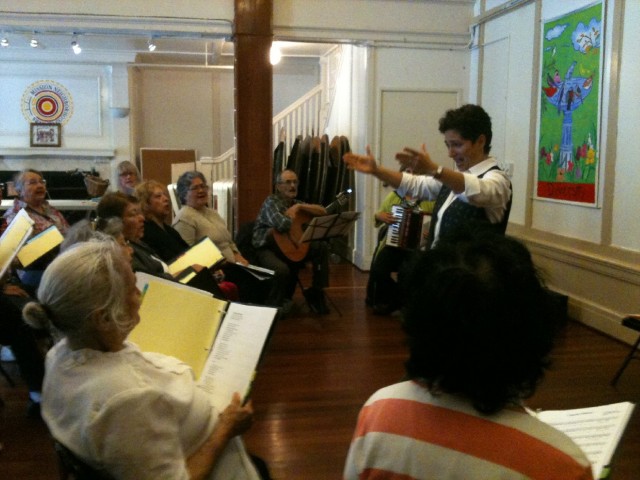"Everyone, they are so kind, so nice, so I feel like I am in home," says Sanchez in accented English. He's originally from Guatemala, and has lived in the U.S. permanently since 1977.
Sanchez says he looks forward to Friday rehearsals. And after just a few weeks of participating, he's feeling better.
"The worse thing that happen to a person, especially older person, is depression," he says. "And you feel important or something useful, depression is gone."
Right about now you might be wondering: Do we really need a study to show singing in a choir has health benefits? It's a question Julene Johnson fields frequently. Johnson, a cognitive neuroscientist at the UC San Francisco Institute for Health & Aging, is interested in the quantifiable health benefits of singing in a choir. Right now, there are almost no hard data. While the team will look at the somewhat predictable psychosocial benefits that Sanchez is already experiencing, they're interested in physical mobility and cognition, too.
"So those three areas will be the primary things we focus on looking at. Will there be change after singing in a choir?" Johnson explains.
Besides improvement in his mood, Sanchez has noticed some other changes.
"It's helped me with my breathing," he says, adding that he's had pneumonia five times. "I know breathing is important. Here I am practicing."
Johnson and her team will launch a dozen choirs -- in English and Spanish -- in San Francisco over the next four years. They're recruiting a diverse group.
"It's very important to be able to design studies that are relevant to individuals of color. As you might imagine, singing in a choir comes from almost any culture," Johnson says. She's also excited about conducting a study outside the confines of the ivory tower of UCSF. "I think there's lots of opportunities to do research studies in the community and involve community participants in particular that are more diverse and represent the communities in which we live," she says.
They're also working to reach vulnerable seniors, people who might not get out too much. Bilingual choir director Martha Rodriguez-Salazar says some singers are quite timid at the beginning.
"They're very afraid of singing or afraid of making mistakes," she says, "or thinking that they're too old to do anything."
But the more she teaches them, Rodriguez-Salazar explains, how to stand in front of an audience or sing while holding up a binder of music, "that really empowers them, gives them knowledge." Choir members rehearse for 90 minutes once a week. On a recent Friday, members were seated for the first half of rehearsal, but they stood for the second half.
Johnson is measuring health and well-being before participants begin in a choir, "then look over time to see how those ratings of health and well-being might change over time with the choir." And all of this can build strength, Johnson says. People who have stronger lower-body strength may fall less, saving them from injury. And avoiding injury could save money.
It's this kind of data that could make a difference to senior centers relying on government funds, needing to prove their programs have make a difference. "These days when they're cutting programs at senior centers left and right," Johnson says, "those senior centers need additional evidence" that they have cost-effective programs.
Francisco Sanchez says he's sold already. "Breathing, discipline ... a lot of things, music is the best for all that."
Community of Voices is enrolling now for choirs in San Francisco's Bayview and Western Addition neighborhoods.
Listen to the story:
